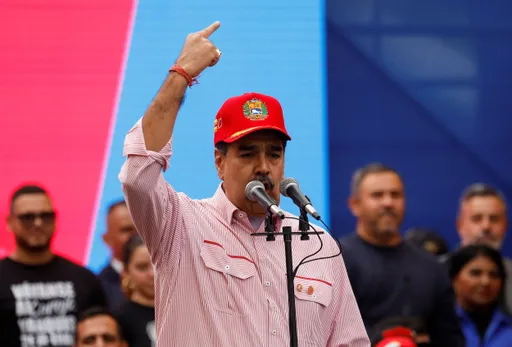TRT World’s show Bigger Than Five, which looks into the changing world order, explores the question of America’s future as a global leader.
Some bitterness can be expected. The United States has played a dominant role in world affairs for nearly a century. And any reference to the contrary will be met with disagreement - especially by President Donald Trump’s supporters.
That’s exactly what happened during TRT World’s show Bigger Than Five when host Ghida Fakhry pressed Corey Lewandowski, Trump’s former campaign manager, to explain Washington’s contradictory economic and geopolitical policies.
As China cements foreign trade alliances and invests in artificial intelligence, the US would rather spend $21 billion on building a wall along its southern border with Mexico under that false premise of stopping crime.
“What we know for sure is that people come back and forth across the border illegally all the time... and they kill Americans,” Lewandowski said in defence of the wall that has become a major political issue in the US.
And what about China’s growing trade surplus with the US?
Lewandowski insists that Beijing steals America’s intellectual property to subsidise its companies, which then flood the US with their products.
“The reasons why their market is collapsing is because this president (Trump) has been tough on China for the first time in a generation.”
“We have a $500 billion trade deficit with China alone on a yearly basis. You know why? Because they don't give us access to their market.”
But many US companies, including technology giants Apple and Cisco, have willingly moved their production facilities to the Chinese heartland where trained workers are readily available.
Besides being sceptical about trade alliances, Trump wants to make it difficult for Chinese goods to enter the US market, denoting a shift in Washington's long-standing position as an upholder of free markets.
All of this is happening while the US is facing economic problems at home.
Take poverty for instance. More than 40 million Americans live below the poverty line, and its total debt stands at 78 percent of the GDP, the highest since the 1950s.
When it comes to the Trump administration's foreign policy, it has alienated America’s key allies.
The European Union is trying to come up a with a way to circumvent the US’s economic sanctions on Iran after Trump pulled out of a treaty that would keep Tehran’s nuclear ambitions in check.
Trump’s attempts to score a diplomatic victory through the denuclearisation of the Korean peninsula has also left much to be desired.
As Fakhry pointed out, during his recent meeting with North Korean leader Kim Jong-un, Pyongyang’s rebuilding of its main rocket launch site came to light.
But Lewandowski says that Trump’s success in this regard can be seen in the fact that North Korea has not test fired a missile since the discussions between the two sides began.
Fakhry also spoke to Vali Nasr, Dean of the Johns Hopkins School of Advanced International Studies and Senior Fellow in Foreign Policy at the Brookings Institution, about North Korea. She asked him if Trump had returned empty handed from his visit.
“Certain taboos were broken like the meeting of the heads of state.
The expectation that there would actually be a deal was never realistic.
The North Koreans were not going to give up their entire strategic asset in one meeting in exchange for just economic relief, which the US could reimpose at any moment after they’d given up their nuclear [programme]. ... President Trump basically set himself up for this outcome. … The option would have been for him to arrive at some steps that would have meant that we might give a little bit and they might give a little.”
In terms of Iran, Fakhry asked if Trump had isolated himself on the Iran nuclear deal made under the Obama administration. Nasr mentioned that the Republican party was never in favour of the deal.
“But the deal should be much bigger than domestic American politics,” he said. “This deal actually reflects the credibility of the United States.”
Going back to North Korea, he reasoned, “Why would the North Koreans sign a deal with any American president if the next president can come in and just undo the deal because he doesn’t like it?”
























